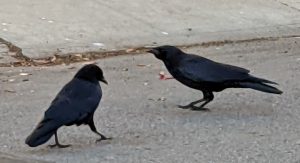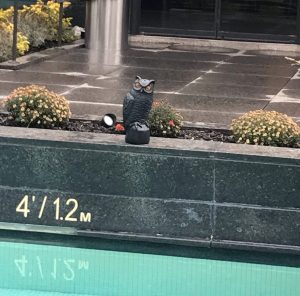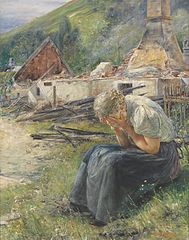It’s odd that the amount of excitement in life can bear almost no relationship at all to how much space one has. What’s even odder is that when life is so full of things to do that it’s bursting at the seams, when I need at least three more hours in any given day that the day starts to reduce to… at the moment… pink sticky notes. My desk is covered in these things. Each one I scrunch up and add to the recycling box is an achievement.
These pink sticky notes are not about achievement. I can edit a novel, or write a conference paper, or prepare a bibliography and not one of these pieces of work made it into pink sticky notes. In fact, I’ve done all three of things, in multiples, over the last few days and not a single pink sticky note was produced.
The pink sticky notes are for the little things that have to be done but can’t take priority over something as large as an approach to a 5,000 word essay. I’ve just scrunched up one that reminded me I had to confirm I’d be at a conference in a couple of weeks. I’ve already written most of the paper for it, but I have two sentences to add, and have a note for those two sentences. I’m about to scrunch up another note, that reminded me to use a consistent plural for an invented word. Yet another tells me that a shop delivers to my suburb once a week. I have no idea what I needed from that shop, or even if it was something I had to check for an entirely different reason. Let me find out and get back to you.
I hope you enjoyed your break. It’s the Canberra branch of a Singapore food outlet and I am missing my Singapore friends, so I was dreaming of getting something delivered on the once-a-week they are doing lockdown deliveries to my part of Canberra. It’s a dream, but a nice one. They have three of my favourite dishes (beef rendang, Hainanese chicken, fried chicken) and I want to know how good they are and I want to have a set and think of friends I had expected to see last year or this. I now know they exist and one day I’ll taste their food.
Now that I know why I wrote a note, I can throw it out. I’ve thrown out a handful of pink sticky notes and the only ones left are actions I have to take. I need to write an article, and some fiction. I have a rather special note that explains the pronunciation of a name in a world friends and I have been working on, and another for my coming New Year’s eve (5 pm, it says, which is a reminder that I’ll be meeting an old friend online at that time and on that day).
I like sticky notes. They look like litter, but are gems. I snuck them into a short story once, to pay tribute to the important role they play on days when I don’t want to use lists.
Basically, they’re a trick I play on myself when I’m not as sorted as I should be. They help me keep up with the small things in life. Not just books I want to read or restaurants I’m curious about. In fact, mostly not these at all. The first ones to be sorted when I am in that mode are the ones that have deadlines. Today I had one that said “Write to R.” That was about a novel, and I had to finish all the work to make the novel ready to write about before I could write that email then scrunch up the note.
Someone asked me the other day how I worked through stress. Sticky notes is one of my favourite methods. When I’m unstressed I can remember everything, or write lists. When the world becomes too much (as it has been for over two years) I deal with some of the stress by littering my desk then symbolically clearing it by recycling everything that’s done. It’s not at all efficient, but it’s very satisfying, especially on a bad day.
When I was young, I thought I’d grow up into handling big things with aplomb. That aplomb was going to make my whole life triumphant and full of vigour. I thought stress was a thing that teenagers suffered and that I would grow out of it. Neither of these things happened. Instead, I developed a raft of tricks for handling my life when it becomes tough. Today was a day when I had to do All the Things, but it was also a day when my body announced its discomfort with me being in it. I had to deal with pain and deadlines. I’ve not done all the things I wanted to finish, but I’ve done a very solid day’s work and I don’t have any outstanding sticky notes. There’s no triumph and hardly any vigour, but I am ending the day with the sense that I haven’t wasted it.
If I can do the same amount tomorrow, then I may even catch up with all the things I need to do before back to back meetings tomorrow night. I shall dream of such an outcome. For the day ended hours ago, and I’m off to sleep.
I suspect I might dream of pink sticky notes tonight. Just suspect, mind.
 Shortly after dawn most mornings, a crow calls loudly, “Caw, caw, caw, caw.” It seems to be speaking to the whole neighborhood of crows, though I’m not sure how large an area this announcement covers. I refer to this as the “Call to Prayer,” because it reminds me of the calls used by mosques, but I don’t know its true purpose.
Shortly after dawn most mornings, a crow calls loudly, “Caw, caw, caw, caw.” It seems to be speaking to the whole neighborhood of crows, though I’m not sure how large an area this announcement covers. I refer to this as the “Call to Prayer,” because it reminds me of the calls used by mosques, but I don’t know its true purpose.

 The COVID-19 pandemic has been raging for many months now, marked from the onset by lies about the disease, its origins, its treatment, and its prevention. No aspect of the pandemic has been free from controversy and misinformation. In the middle of flame wars and whack-a-mole efforts to squelch anti-vaccine, anti-mask internet sites lies the confusion and grief of those who have lost loved ones to this disease (over 700,000 in
The COVID-19 pandemic has been raging for many months now, marked from the onset by lies about the disease, its origins, its treatment, and its prevention. No aspect of the pandemic has been free from controversy and misinformation. In the middle of flame wars and whack-a-mole efforts to squelch anti-vaccine, anti-mask internet sites lies the confusion and grief of those who have lost loved ones to this disease (over 700,000 in